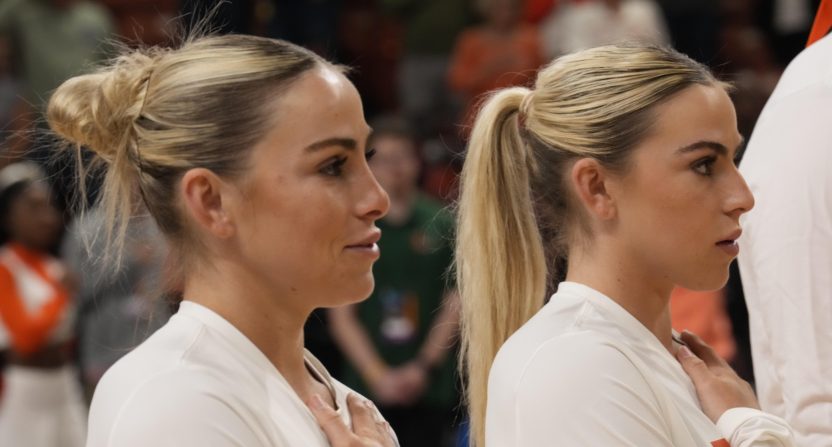Tuesday, Bari Weiss-led outlet The Free Press posted an article titled The NCAA Has a ‘Hot Girl’ Problem. It highlighted Haley and Hanna Cavinder, two former women’s college basketball players who garnered lots of NIL money (albeit with some controversy) based on their social media followings.
Penned by former ESPN and The Athletic beat reporter Ethan Strauss, the piece was specifically about the Cavinder Twins, but also about the phenomenon of “blonde, girl-next-door” female athletes who have rocketed to the top of the NIL game regardless of how they perform in their given sport. The Cavinder Twins, along with LSU gymnast Olivia Dunne, have been able to bank a lot of money off of name, image, and likeness rights, though not without drawing attention from the NCAA and critics.
“The Cavinder Twins, the emerging oligarchs of women’s college basketball, aren’t the best players. But they might be the best-looking,” read the article’s subtitle.
The article mostly recounts Haley and Hanna’s rise through social media, their start playing college basketball at Fresno State, and the NIL deals that played a role in bringing them to Miami last season before they decided they’d forgo their final season of eligibility and announced they’ll be working with the WWE and Jake Paul’s Betr.
The piece also juxtaposes their journey with commentary and quotes about the state of NIL and how conventionally attractive female athletes presumably have a leg-up in earning money over better performers.
“…there’s the way things are supposed to be, a world in which male and female athletes are genderless machines, and the only thing that matters is how fast, how strong, and how skilled they are,” wrote Strauss. “And then there’s the way things really are, a world in which most people who watch sports are dudes with paunches and six-packs of beer. They appreciate girls who can shoot three-pointers, but really, they like girls in bikinis making mindless videos—OnlyFans with a dollop of ‘wellness.'”
After the article was published, the twins released a statement on social media, objecting to the thesis of the article and claiming that their interview “was obtained by a false pretense.”
https://t.co/JLPU6Swa9i pic.twitter.com/WtOp5fYuNx
— Hanna Cavinder (@CavinderHanna) June 13, 2023
“The interview for this article was obtained by a false pretense that it would be written about life after NIL, why we didn’t take our fifth year, our passions, and business opportunities,” said the statement. “Haley and I welcomed this man into our home. … After the weekend we had a sit-down interview in our kitchen for over an hour and was only asked one question about our “physical looks.
“The subsequent article not only demeaned our athletic achievements and business accomplishments it furthered the narrative that hard-working, creative, and driven women can only do well if they are deemed attractive. … We are both disappointed and disgusted by this journalism practice and blatant sexist trope. We only wish to inspire young [women] to chase their dreams, work hard, dream big. Now we must also defend them against men that wish to sum their potential to physical appearance.”
Also Tuesday, Strauss wrote a post in his newsletter that went into detail about the interview opportunity and expanded on his thoughts on how people like the Cavinders might just be the future of sports media. While he doesn’t comment on the twins’ feedback on the article, he does share further thoughts on what they represent.
“The newish fear in sports media is that writers are going to be replaced by AI,” said Strauss. “Maybe, though I’m not sure how big incoming generations are on reading, to be blunt about it. Instead they prefer audiovisual content, and quickly as you can provide it. The kids won’t seek out someone like the old me, not at scale anyway. Instead, they’ll seek out the provider who best understands how to be sought. For now, those voices are noninstitutional. Tomorrow, the institutions will sign up these super-influencers. The real threat to the industry isn’t a machine. It’s a good-looking young person who happens to think like one.”







